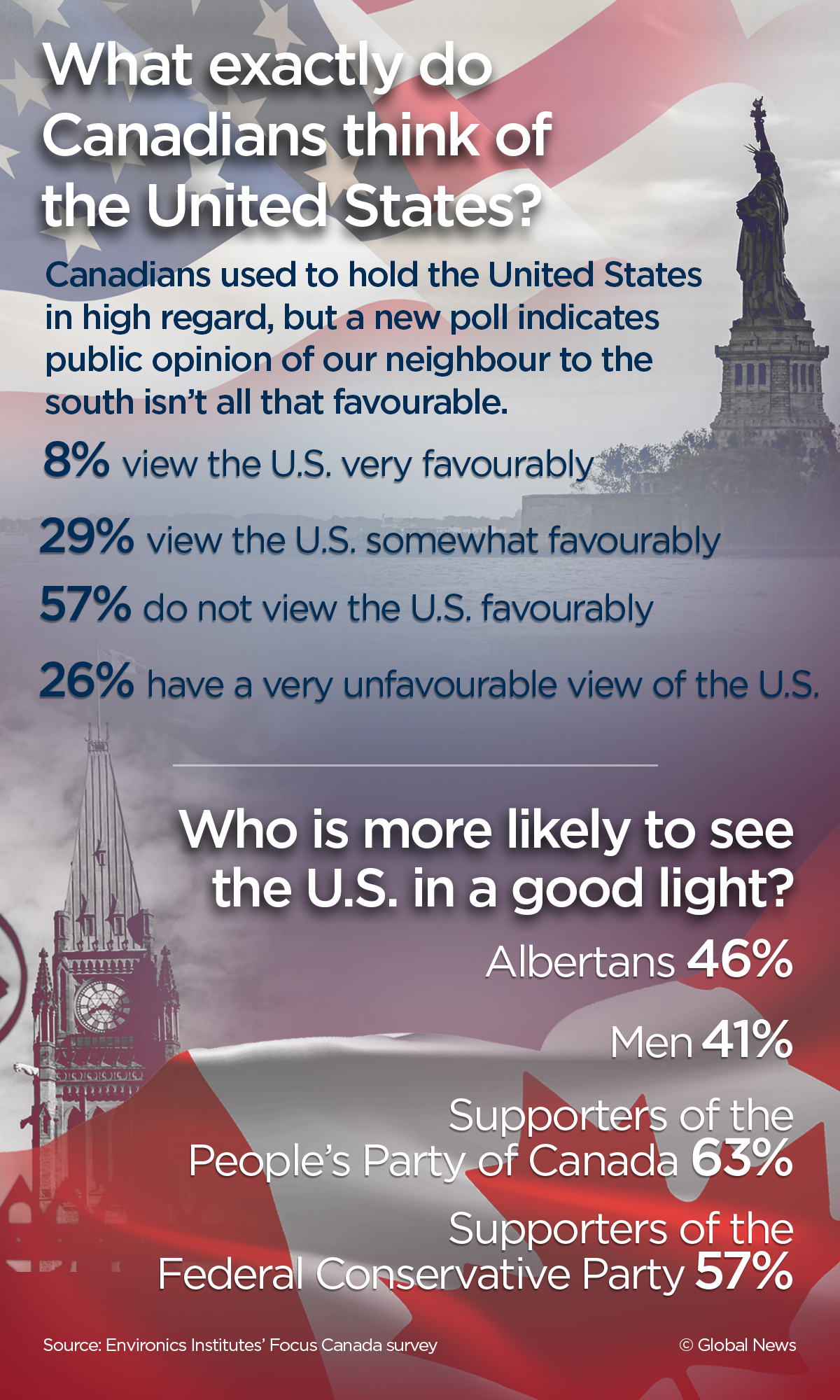Canadians used to hold the United States in high regard, but a new poll indicates public opinion of our neighbour to the south has soured.

Just 37 per cent of Canadians surveyed looked at the U.S. with admiration, according to new research from Environics Institute, which has been tracking Canadian public opinion since 1976.
This year marks an “unprecedented” low, a word pollsters rarely use, wrote Environics Institute president Michael Adams in a blog post. It’s Canadian’s lowest overall opinion of the U.S. on record, down from peak admiration at 83 per cent in 1983.
“These are lows we’ve never seen before,” wrote Adams, before noting that if polling went back to the War of 1812, “the proportions admiring the U.S. and its leaders might have been lower.”
Environics interviewed 2,000 Canadians between Oct. 1 and Oct. 14. Their survey shows that while more than a third of Canadians view the U.S. favourably, that drops to just 13 per cent when it comes to how they see Trump.
Indeed, Adams wrote that President Donald Trump and “his bullyish style and America-first policies” factor into the results. It’s not the first time since Trump was elected in November 2016 that polls have indicated global opinion of the U.S. is less than favourable.
A Pew Research Center study last month found that the global image of the U.S. had also reached a historic low, with a majority of people expressing little confidence in Trump.

Get daily National news
While the results of the Environics survey are unsurprising, Victor Konrad, an adjunct professor at Carleton University who teaches about border relationships, says that Canadians shouldn’t just shrug off the results.
“We’re inextricably tied to the United States,” says Konrad, who is a dual citizen.
“We’re linked economically but there’s so much more to it than that.”
In addition to Trump, Adams wrote that other factors responsible for Canadians’ low opinion of America include “the nightmarish mixing of guns and bigotry.” Think of shootings in Charleston, Orlando, and Pittsburgh, the list goes on.
“Some Canadians would still like to see their country be more, not less, like the United States,” Adams wrote. But “a majority of Canadians seem to feel that America’s advertisements for itself are not what they used to be.”
That makes sense to Konrad, who says the chasm between the two countries has been growing since 9/11.
“There’s this tension, this underlying tension, that seems to be developing which is an indication of how difficult things have become there.”
The border is no longer a line that demarcates the two nations, Konrad says, it’s a way in which entire border communities are separated and differences enhanced.
Konrad, who is currently supervising a study on snowbirds — those who flee Canada to spend the winter months in the warm, southern U.S. — says that some, like his relatives, are starting to feel uneasy during their American stay, worried and uncertain about their rights and safety in an America they perceive to be increasingly polarized.
“It’s having direct implications for the lives of Canadians and Americans.”
This Environics Institute survey was based on telephone interviews conducted (via landline and cellphones) with 2,000 Canadians between Oct. 1 and Oct. 14, 2018. A sample of this size drawn from the population produces results accurate to within plus or minus 2.2 percentage points in 19 out of 20 samples.














Comments